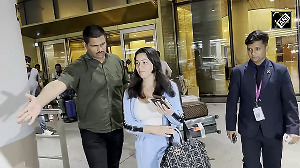Appearing before the powerful Senate Foreign Relations to talk about the AfPak strategy going forward in the wake of the trilateral summit between Obama and the Pakistani and Afghan presidents Asif Ali Zardari and Hamid Karzai last week at the White House, Holbrooke, said, "Senator, I appreciate the questionit's of the highest importance.(But) With great respect, since we are in the final days and hours of an election in India where 700 million people are voting, and since any comment I would make, might be misunderstood in that context, I would rather just simply restrict myself to saying that my job is Afghanistan and Pakistan," he said.
However, Holbrooke, who was responding to the question posed by Senator Robert P Casey Jr, Pennsylvania Democrat, and close ally of Obama who helped the latter carry Pennsylvania in the presidential election, pointed out that "at all steps in the process, we keep the Indians fully informed.They are not only an interested party, they are arguably the interested party," he emphasized, "although many other countries, including most notably China and Iran have borders with Afghanistan and have also interests."
But Holbrooke reiterated that "India's interests are very high--India is the great regional power and I have great personal respect and affection for India." He told the lawmakers that "they (India) have a new ambassador (Meera Shankar)who just arrived and I met her as soon as she was in Washington, and we will keep India fully informed and the issues you raised are on great concern to us. But, if you'll permit me, I'd like to stop at that point," Holbrooke implored.
Casey in his preamble to this question, spoke of the Pakistani military obsession with India, which according to some analysts and even the Obama Administration, led to their denial that the Taliban and al Qaeda threat was a more existential threat to Pakistan than India is, and have urged Pakistan to move more troops from its eastern border to its western front. "I think that most Americans can understand or appreciate some of that obsession," Casey argued. "Every country, has its focus--we had a threat over many generations posed by the Soviet Union. (So), We understand that."
But, he bemoaned that "it's becoming an increasingly difficult problem to solve because if the Pakistani government and their military forces are focused only or largely on India, it's going to be very difficult to make it work militarily." Casey said, "I ask you this and I say this as someone last May--I was in all three countries (India, Pakistan and Afghanistan) and at one point sitting with the National Security Adviser in India in the context of Iran, I said, 'Look, I know that you have a lot of ties to Iran--India does. And, I know that you have strong relationships. But you got to help us with this nuclear threat posed by Iran.'"
The Senator told Holbrooke, obviously in pushing the Administration to urge New Delhi to ease up on its tensions with Pakistan to facilitate the AfPak strategy, that "we've asked a lot of countries and countries have asked us to set aside or to move to one side temporarily, a rivalry or concern.I ask you this and I know it's a long lead-up, (but) I ask you this with regard to Indiasteps that India an take in the context of this whole discussion to help lower the temperature or create an environment where Pakistan can ease up a little bitas they have already because I know they've moved some of their military forces from the borderbut are there efforts that India can undertake, not just on its own, but by our urging that would help here."
But Holbrooke just wasn't biting, particularly not on the eve of the final phase of India's election.






 © 2025
© 2025